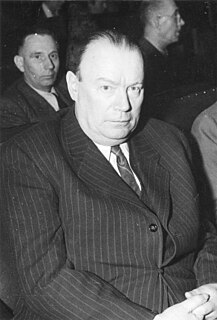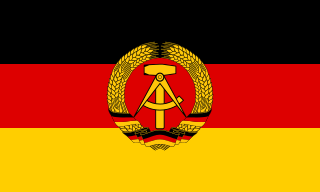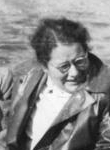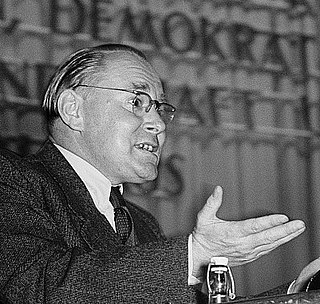Related Research Articles

Saxony-Anhalt is a state of Germany, bordering the states of Brandenburg, Saxony, Thuringia and Lower Saxony. It covers an area of 20,447.7 square kilometres (7,894.9 sq mi) and has a population of 2.19 million inhabitants, making it the 8th-largest state in Germany by area and the 11th-largest by population. Its capital is Magdeburg and its largest city is Halle (Saale).

The Socialist Unity Party of Germany, often known in English as the East German Communist Party, was the governing Marxist–Leninist political party of the German Democratic Republic from the country's foundation in October 1949 until its dissolution after the Peaceful Revolution in 1989. The party was established in April 1946 by the merging of the Communist Party of Germany and Social Democratic Party of Germany.

Friedrich Wilhelm Reinhold Pieck was a German communist politician who served as the chairman of the Socialist Unity Party from 1946 to 1950 and as president of the German Democratic Republic from 1949 to 1960.
Dr. Erhard Hübener was a German politician and member of the German Democratic Party (DDP) until 1933. After World War II he engaged in rebuilding structures of self-rule in the Soviet occupation zone and was co-founder and member of the Liberal Democratic Party of Germany (LDPD).

Friedrich "Fritz" Ebert Jr. was a German politician and East German communist official, the son of Germany's first president Friedrich Ebert.

Wilhelm Zaisser was a German communist politician and statesman who served as the first Minister for State Security of the German Democratic Republic (1950–1953).

The German Democratic Republic (GDR), German: Deutsche Demokratische Republik (DDR), often known in English as East Germany, existed from 1949 to 1990. It covered the area of the present-day German states of Mecklenburg-Vorpommern, Brandenburg, Berlin, Sachsen, Sachsen-Anhalt, and Thüringen. This area was occupied by the Soviet Union at the end of World War II excluding the former eastern lands annexed by Poland and the Soviet Union, with the remaining German territory to the west occupied by the British, American, and French armies. Following the economic and political unification of the three western occupation zones under a single administration and the establishment of the German Federal Republic in May 1949, the German Democratic Republic was founded on 7 October 1949 as a sovereign nation.

Heinrich Gottlob "Heiner" Rau was a German communist politician during the time of the Weimar Republic; subsequently, during the Spanish Civil War, he was a leading member of the International Brigades and after World War II a leading East German statesman.

Paul Verner was a German communist politician. He joined the communist movement at a young age and went into exile during Adolf Hitler's rule. Verner became a prominent political personality in the German Democratic Republic after the war.

Erich Mückenberger was a German socialist politician. He began his political career in the Social Democratic Party of Germany (SPD). He became a member of the Socialist Unity Party of Germany (SED) when the East German branches of SPD and the Communist Party of Germany merged after the Second World War. Mückenberger was one of the most high-ranking former Social Democrats in the German Democratic Republic and held several positions in the SED.

Wilhelm Koenen was a communist and an East German politician. He was married to Emmy Damerius-Koenen and was the father of Heinrich Koenen and Johanna Koenen.

Kurt Vieweg was one of the leading agricultural politicians in the early years of the GDR. He was at various times Secretary General of the VdgB, deputy in the parliament and a member of the Central Committee of the SED.

Bernard Koenen was a German politician.

Wolfgang Rauchfuß was a member of the Politburo of East Germany's ruling SED (party). He was also a government minister and deputy chairman of the country's Ministerial Council.
Otto Körting was a German politician.

Hermann Pöschel was a politician and an important official in the German Democratic Republic's ruling Socialist Unity Party .

Rüdiger Fikentscher is a german politician and academic.

Margarete "Grete" Wittkowski was a German economist and politician. Between 1961 and 1967 she served as deputy chair of the East German Council of Ministers, the only woman ever to hold this post. Between 1967 and 1974, she served as President of the East German National Bank.

Fred Oelßner was a German communist politician, ecomomist and a leading political figure in the German Democratic Republic.

Hermann Matern was a German communist politician (KPD) and high ranking functionary of the Socialist Unity Party of Germany and statesman in the German Democratic Republic.
References
- 1 2 3 4 Müller-Enbergs, Helmut; Barth, Bernd-Rainer (2006). "Wessel, Paul". Wer war wer in der DDR [Who was who in the GDR?] (in German). 2 (4 ed.). Berlin: Ch. Links. ISBN 3-86153-364-2. OCLC 77495465 . Retrieved December 25, 2010.